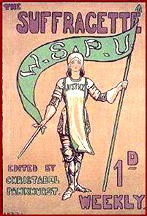

|
1642-6 |
The Great Civil War |
|
1642 |
Charles I (Stuart; Anglican) captured. Queen Henrietta Maria and Charles, Prince of Wales, escape to France. |
|
1649 |
Charles I beheaded. |
|
1649-60 |
The Interregnum; the Commonwealth established. |
|
1653 |
Oliver Cromwell (Puritan) becomes Lord Protector of the Commonwealth. |
|
1658 |
Oliver Cromwell dies; his son Richard attempts to succeed him. |
|
1660 |
The Restoration. Charles (II—Anglican) returns from France and takes the throne. |
|
1681-5 |
Parliament does not meet. Court holds power. |
|
1685 |
Charles dies; his brother James (II; Roman Catholic) succeeds him. Threat of "popery." |
|
1688 |
James,
Prince of Wales born. This means the crown will pass to him, a
Roman Catholic, rather than to the King's Anglican siblings.
|
|
1688-1788 |
For 100 years, till the death of Bonnie Prince Charlie, England feels the threat of an invasion from France which would restore Stuart (Jacobite), and thus Roman Catholic, rule. In fact, Jacobite risings occur twice during this period, in 1715 and 1745. |
|
1694 |
Mary dies; William (III) sole ruler. |
|
1701 |
James II dies in France. Act of Settlement directs succession, should Anne die childless, to the (Protestant) House of Hanover--unless "the Old Pretender," James (son of James II) or, later, Bonnie Prince Charlie, "the Young Pretender," would ! abjure Roman Catholicism. (See the chart of kings and queens.) |
|
1702 |
William dies; Anne (Mary's Anglican sister) succeeds. |
|
1707 |
Act of Union between Scotland and England. |
|
1702-13 |
War of the Spanish succession. |
|
1713 |
Peace of Utrecht. |
|
1714 |
Anne dies; Dynastic crisis; George I (of Hanover) succeeds unopposed. |
|
1715 |
Jacobite rebellion. |
|
1720 |
Charles
Edward Stuart (a.k.a. Bonnie Prince Charlie or the Young
Pretender) born in France
to
James (the Old Pretender). |
|
1721-42 |
Robert Walpole Prime Minister. |
|
1727 |
George I dies; George II crowned. |
|
1733 |
John Kay's flying shuttle. |
|
1745 |
Jacobite rising in support of Bonnie Prince Charlie. |
|
1754 |
Anglo-French war begins in North America. |
|
1755 |
Lisbon earthquake. |
|
1756-63 |
Seven Years' War. |
|
1757 |
Clive captures India from the French. |
|
1758 |
first threshing machine. |
|
1759 |
British Museum opens. |
|
1760 |
George
II dies; his grandson crowned George III. |
|
1763 |
Treaty of Paris ends the Seven Years' War. France cedes Canada and the Mississippi Valley to Britain. |
|
1764 |
Hargreaves invents the spinning jenny. |
|
1766 |
James "the Old Pretender" dies in France. |
|
1769 |
Arkwright invents a spinning machine. |
|
1771 |
Arkwright's first spinning mill. |
|
1773 |
Boston Tea Party. |
|
1774 |
Priestly
isolates oxygen. |
|
1775 |
American
Revolution begins. |
|
1776 |
Adam
Smith, The
Wealth of Nations.
|
|
1778 |
Rousseau and Voltaire die. |
|
1779 |
first steam powered mills. Crompton invents spinning "mule." |
|
1781 |
Cornwallis surrenders to Washington at Yorktown, Va. |
|
1782 |
Lord North resigns; full Parliamentary government restored. |
|
1783 |
Peace treaty signed in Paris between Great Britain and the United States. |
|
1785 |
Cartwright builds power loom. |
|
1786 |
Coal gas first used for lighting. |
|
1787 |
Warren Hastings impeached. |
|
1788 |
Bonnie Prince Charlie dies in France. |
|
1789 |
Bastille
falls; French
Revolution
begins.
|
|
1791-2 |
Paine, The Rights of Man. |
|
1792 |
Reign of Terror in France. |
|
1793 |
Louis
XVI executed in France. England and
France at war. |
|
1794 |
Execution of Robespierre ends the Reign of Terror. |
|
1796 |
Invasion of England threatened. |
|
1798 |
Battle
of
the Nile. |
|
1799 |
Napoleon named First Consul of France. |
|
1801 |
Union of Great Britain and Ireland. |
|
1804 |
Napoleon declared Emperor. |
|
1805 |
Battle of Trafalgar. |
|
1809 |
Napoleon captures Vienna. |
|
1811 |
Prince of Wales named Regent to act for George III, now insane. |
|
1811-12 |
Luddite riots in the North and the Midlands. Laborers attack factories and break up the machines which they fear will replace them. |
|
1812 |
Napoleon invades Russia. |
|
1812-14 |
War of 1812 between England and the United States. |
|
1814 |
Treaty
of Ghent ends Anglo-U.S. War. |
|
1815 |
Napoleon
escapes Elba; begins the "Hundred Days." |
|
1817 |
David Ricardo, Principles of Political Economy. |
|
1819 |
Peterloo Massacre of Corn Law protestors. |
|
1820 |
George III dies; succeeded by Prince Regent as George IV. Cato Street Conspiracy |
|
1821 |
Napoleon dies. |
|
1822 |
Classical Tripos established at Cambridge. |
|
1823 |
London Mechanics Institute founded. |
|
1827 |
Thomas Arnold appointed to Rugby. |
|
1829 |
Catholic
Emancipation Act. |
|
1830 |
George
IV dies; his brother William IV succeeds. |
|
1832 |
First Reform Bill: adds £10/year householders to the voting rolls and reapportions Parliamentary representation much more fairly, doing away with most "rotten" and "pocket" boroughs. Adds 217,000 voters to an electorate of 435,000. |
|
1833 |
Slavery
abolished throughout the British Empire. |
|
1834 |
New
Poor
Law. |
|
Late 1830s |
First of the Parliamentary "Blue Books"—facts and figures about England compiled by the Royal Commissioners. |
|
1836-48 |
|
|
1837 |
William IV dies; succeeded by his niece, Victoria. |
|
1838 |
Regular Atlantic steamship service begins. |
|
1839 |
Anti-Corn-Law League founded. |
|
1840 |
Queen
Victoria
marries
her cousin Albert, who becomes Prince Consort. |
|
1842 |
Chartist
Riots. |
|
1845-6 |
Potato Failure in Europe; starvation in Ireland. Corn Laws (which had kept up the price of grain) repealed. |
|
1848 |
Revolutions
in Europe. |
|
1849 |
Gold discovered in California and Australia. |
|
1850 |
Telegraph cable laid under English Channel. |
|
1851 |
Great
Exhibition
("Crystal
Palace").
|
|
1853-6 |
|
|
1855 |
Livingston
discovers Victoria Falls. |
|
1857-8 |
|
|
1858 |
First Atlantic cable laid. |
|
1860 |
Garibaldi takes Naples; unification of Italy. |
|
1861 |
Albert dies; Victoria retires into mourning. |
|
1861-5 |
American Civil War. |
|
1862 |
Bismarck becomes Prussian premier. |
|
1864 |
Geneva Convention establishes Red Cross. |
|
1866 |
Italy
defeated by Austria. |
|
1867 |
Second
Reform Bill: enfranchises many workingmen; adds 938,000 to an
electorate of 1,057,000 in England
and
Wales. (Disraeli's
legislation) |
|
1869 |
Suez
Canal opened. |
|
1870 |
Forster's
Elementary Education Act
establishes
School Boards. |
|
1870-1 |
Franco-Prussian War. |
|
1871 |
University
Tests Act removes religious tests at Oxford and
Cambridge. |
|
1873 |
Population of the United Kingdom at 26 million (France 36 million). |
|
1876 |
Victoria
named Empress of India. |
|
1877 |
Transvaal annexed. |
|
1879 |
Somerville
and Lady Margaret
Colleges (for women)
founded at Oxford. |
|
1880 |
|
|
1881 |
Cambridge Tripos exams opened to women. |
|
1882 |
Triple
Alliance (Germany, Italy, and Austria).
|
|
1883 |
"Oom
Paul" Kruger named president of the South African Republic.
|
|
1884-5 |
Third Reform Act and Redistribution Act extend vote to agricultural workers; electorate tripled. |
|
1885 |
Fall of Khartoum. |
|
1886 |
First (Irish) Home Rule bill rejected. |
|
1887 |
Queen Victoria's Golden Jubilee. |
|
1889 |
London dock workers and match girls strike for 6d./hour. |
|
1890 |
Parnell--O'Shea divorce case ends Parnell's influence; no Home Rule for Ireland. |
|
1894 |
Dreyfus trial in France. |
|
1895 |
U.S. equals the U.K.'s industrial output. |
|
1897 |
Victoria's Diamond Jubilee. |
|
1898-99 |
Spanish-American War. |
|
1899-1902 |
|
|
1901 |
Victoria dies; Edward Prince of Wales succeeds. |
|
1903 |
U.S. acquires Canal Zone from Panama. |
|
1904 |
Entente Cordiale (England and France). |
|
1905 |
Revolution in Russia. |
|
1914-18 |
The "Great War" (World War I). |
|
1916 |
Easter Rising in Dublin. |
|
1917 |
Russian Revolution. |
|
1918 |
all men over 21 and women over thirty enfranchised. |
|
1922 |
Irish
Free State established. |
|
1928 |
Equal Franchise Act grants right to vote to women over 21 (as well as men). |
|
1936-8 |
Spanish Civil War. |
|
1938 |
Chamberlain cedes Czech territory to Hitler at Munich. |
|
1939-45 |
World War II. |
